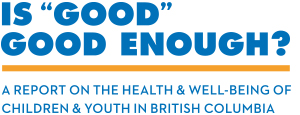Child Numeracy
Indicator #48: Child Numeracy
Indicator 48: Percentage of BC students in grade 4 or grade 7 (writers only) who meet or exceed expectations on the grade 4 and grade 7 Numeracy section of the Foundation Skills Assessment.
Jump to Figure Notes and Sources
Key Messages
- Numeracy, or number skills, refers to the "…ability to apprehend the value of small quantities immediately, make judgments about numbers and their magnitudes, grasp counting principles, and join and separate sets."1
- Research has shown that socio-economic differences contribute to variances in child numeracy between children.2,3,4
- While there is minimal overall compelling evidence to connect child numeracy to health outcomes, one study showed that higher math scores in adolescence are associated with a 2 per cent reduction in the likelihood of developing adult drug use disorders.5
- Figure 48.1 shows that among BC children in grades 4 and 7 who completed the Foundation Skills Assessment (FSA), the percentage who met or exceeded expectations on the Numeracy section was relatively consistent from 2007/08 to 2014/15. The data for this period also show that the percentage of children who met or exceeded expectations in grade 4 was higher than in grade 7.
- Similarly to Indicator #47 results regarding reading, Figure 48.2 indicates geographic differences in the percentage of grade 4 and grade 7 students meeting or exceeding expectations on the Numeracy section of the FSA, whereby Northern Health had 20 per cent fewer students classified as meeting or exceeding expectations compared to Vancouver Coastal Health. Furthermore, this variation is even more evident when data are examined by health service delivery area, which shows a differential of over 30 per cent between the highest and lowest (Figure 48.3).
Figure Notes and Sources
Figure 48.1
Notes: "Meet or exceed expectations" means an assessment of Meets Expectations (Minimal to Moderate), Fully Meets Expectations, or Exceeds Expectations on the Foundation Skills Assessment (FSA). Data only include those students who wrote the FSA.
Data source: BC Ministry of Education, Foundation Skills Assessment scores, 2007/08-2014/15. Prepared by the Surveillance and Epidemiology Team, BC Office of the Provincial Health Officer, 2016.
Figure 48.2
Notes: "Meet or exceed expectations" means an assessment of Meets Expectations (Minimal to Moderate), Fully Meets Expectations, or Exceeds Expectations on the Foundation Skills Assessment (FSA). Data only include those students who wrote the FSA. Health authority is based on the location of the school.
Data source: BC Ministry of Education, Foundation Skills Assessment scores, 2014/15. Prepared by the Surveillance and Epidemiology Team, BC Office of the Provincial Health Officer, 2016.
Figure 48.3
Notes: "Meet or exceed expectations" means an assessment of Meets Expectations (Minimal to Moderate), Fully Meets Expectations, or Exceeds Expectations on the Foundation Skills Assessment (FSA). Data only include those students who wrote the FSA. Health service delivery area is based on the location of the school.
Data source: BC Ministry of Education, Foundation Skills Assessment scores, 2014/15. Prepared by the Surveillance and Epidemiology Team, BC Office of the Provincial Health Officer, 2016.
References
- Jordan NC, Kaplan D, Ramineni C, Locuniak MN. Early math matters: kindergarten number competence and later mathematics outcomes. Dev Psychol. 2009 May;45(3):850-67.
- Klibanoff RS, Levine SC, Huttenlocher J, Vasilyeva M, Hedges LV. Preschool children's mathematical knowledge: the effect of teacher “math talk”. Dev Psychol. 2006 Jan;42(1):59-69.
- Jordan NC, Levine SC. Socioeconomic variation, number competence, and mathematics learning difficulties in young children. Dev Disabil Res Rev. 2009;15(1):60-8.
- Jordan NC, Glutting J, Ramineni C. The importance of number sense to mathematics achievement in first and third grades. Learn Individ Differ. 2010 Apr 1; 20(2): 82-8.
- Fothergill KE, Ensminger ME, Green KM, Crum RM, Robertson J, Juon HS. The impact of early school behavior and educational achievement on adult drug use disorders: a prospective study. Drug Alcohol Depend. 2008 Jan 1;92(1-3):191-9.
